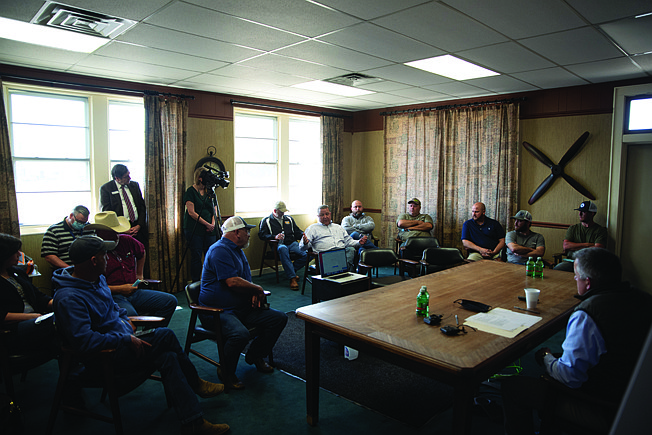TEXARKANA, Ark. -U.S. Rep. Bruce Westerman, R-Arkansas, criticized the Biden administration's energy policies Monday in a roundtable discussion with local workers and business owners affected by them.
In a meeting at Texarkana Regional Airport, Westerman, a Republican who represents Arkansas' 4th Congressional District, listened to the concerns of a group of pipeline construction workers, union representatives, farmers and energy industry businessmen and expressed his own concerns.
Kerry Halter, president of United Steel Workers Local 752L, which represents employees of the local Cooper Tire and Rubber Co. plant, spoke about how increased demand and reduced supply of petroleum products - the raw materials used to manufacture tires - affects the business.
"Everybody here, whether you drove or whether you rode, got here on tires. The raw materials that that go into producing tires is made by oil. So how does that trickle down? It goes into increasing that price, raw materials. Manufacturers are only going to absorb so much of that cost, and then it's pushed back to the consumer.
"It's something that we're not going to feel it now. But in two or three years from now, by the time it hits us, the door's already slammed in our face. It's going to happen. It's not a matter of if, it's when. It's going to happen to everybody. As the prices go up, people make adjustments," Halter said.
Farmer Kenneth Eagle said he has seen costs of fertilizer and fuel skyrocket recently because of increasing fossil fuel prices.
"You can't anticipate the kind of increase in costs we've seen in the last three months.
"As those as those costs go up, I guess it trickles on down. I mean somebody's got to pay for it, and fortunately for us a little bit to handle some of these increase in our costs, grain prices have increased. But like I said, fertilizer costs have doubled, fuel costs have doubled. Our grain price has not doubled," he said.
Chief among the policies Westerman criticized were executive orders signed by President Joe Biden that halted construction of the Keystone XL crude oil pipeline and banned fossil fuel production on federal lands, citing environmental and climate change concerns.
On Inauguration Day, Jan. 20, one of Biden's first executive orders as president was to revoke the permit for the pipeline, which would have transported oil from Alberta, Canada, to Nebraska.
In addition to eliminating jobs for those working on the pipeline, stopping its construction will force oil transportation by means more harmful to the environment and threaten American energy independence, Westerman said.
"Data shows that a pipeline is the most environmentally friendly, cost-effective way to transport oil and gas. Crude oil's going to go to the markets, which are the refineries, it's going to get refined, and it's going to go back out to the users.
"And we can do that through a pipeline, or we can do it through rail cars and trucks, which aren't as safe or as environmentally friendly, or we're going to be importing it from OPEC on ships, which we know what happens when you have an oil spill on a ship.
"So this was going to be a brand new, high tech pipeline, that the energy used to transport the material was going to be all renewable energy. So it was very innovative, but now it's going nowhere," he said.
The production ban on federal land is just the beginning, Westerman said.
"I think they're going to make this permitting slowdown permanent. I think they're just going to totally stop any kind of new energy production on federal lands. I believe they will use the Endangered Species Act and other environmental laws to come after producers on private lands, as well," he said.
Westerman said he takes offense at being accused of not caring about the environment, and that solutions to environmental problems will come from innovative technologies.
"I think we've got to push and push and maybe get the Biden administration to back up on this, but I'm not going to hold my breath on them doing that. We need to use the energy we've got in the most environmentally friendly and effective way that we can while we develop new technologies.
"I believe in American innovation, that we will come up with ways to make cleaner energy, just like we've done with natural gas. Because of the natural gas revolution in the United States, we've reduced our greenhouse gas emissions more than the top 12 countries combined that are part of the Paris climate accord.
"That happened because of innovation, because we figured out how to do horizontal drilling and fracking and to get more of these resources to the surface, and as we know, natural gas burns much cleaner and is more efficient than other forms of fossil fuels," he said.


